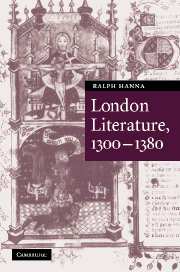Book contents
- Frontmatter
- Contents
- List of abbreviations
- In Thrall
- 1 English vernacular culture in London before 1380: the evidence
- 2 The ‘Old’ Law
- 3 Reading romance in London: The Auchinleck Manuscript and Laud misc. 622
- 4 Pepys 2498: Anglo-Norman audiences and London biblical texts
- 5 Anglo-Norman's imagined end
- 6 ‘Ledeþ hire to Londoun þere lawe is yshewed’: Piers Plowman B, London, 1377
- The end of early London literature
- Bibliography
- Index of manuscripts cited
- General index
- Cambridge Studies in Medieval Literature
4 - Pepys 2498: Anglo-Norman audiences and London biblical texts
Published online by Cambridge University Press: 22 September 2009
- Frontmatter
- Contents
- List of abbreviations
- In Thrall
- 1 English vernacular culture in London before 1380: the evidence
- 2 The ‘Old’ Law
- 3 Reading romance in London: The Auchinleck Manuscript and Laud misc. 622
- 4 Pepys 2498: Anglo-Norman audiences and London biblical texts
- 5 Anglo-Norman's imagined end
- 6 ‘Ledeþ hire to Londoun þere lawe is yshewed’: Piers Plowman B, London, 1377
- The end of early London literature
- Bibliography
- Index of manuscripts cited
- General index
- Cambridge Studies in Medieval Literature
Summary
The depiction of Beves as a divinely ‘helped whelp’ speaks to one of the great paradoxes of romance. Northrop Frye encapsulates it in his provocative description of the form as involving ‘fables of identity’. The poems build their exemplarism, the integrated individual capable of restoration to, and consequent restoration of, his paternal locale, through a process of successive and shifting representations. But not only do these shift; no one of the representations can itself be other than fragmented and plural (the hero's identity/his represented identity). Thus, the pluralistic narrative métier of the genre always plays against its larger foundational claims to singularity or identity, and, more importantly, threatens the social work the genre, as secular ‘master-narrative’, always claims it is performing. The first twenty lines of Guy of Warwick, for example, put the paradox forthrightly:
Fayre aduenturis hadden they,
For euere they louyd sothfastenesse,
Faith with trewthe and stedfastnesse.
Therfore schulde man with gladde chere
Lerne goodnesse, vndirstonde and here.
Who my[ch]e it hereth and vndirstondeth it
By resoun, he shulde bee wyse of witte,
And Y it holde a fayre mastrye
To occupye wisedome and leue folye.
(Caius MS 12–20)Like the similar opening of the later Wars of Alexander, Guy is presented as offering exemplaristic historical knowing, available in verse. Reading or hearing the poem is a wise occupation, and one that leads to appropriate moral knowledge, a sobriety in touch with the largest abstract verities.
- Type
- Chapter
- Information
- London Literature, 1300–1380 , pp. 148 - 221Publisher: Cambridge University PressPrint publication year: 2005

